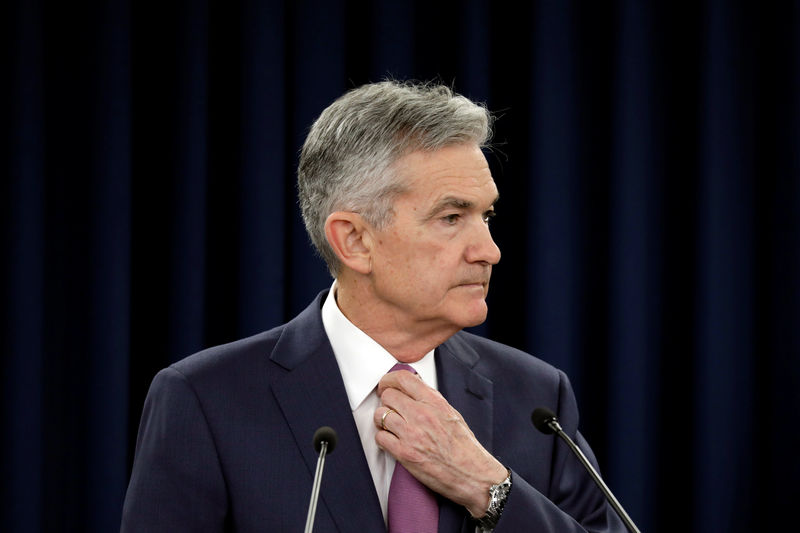* Europe indexes fall to lowest in two years
* Oil falls 4 percent
* Tokyo, Seoul bourses join Chinese benchmarks in bear market
* Fed seen less dovish than hoped (Updates prices, adds strategist comment)
By Tom Wilson
LONDON, Dec 20 (Reuters) - World equity markets slipped on Thursday after the U.S. Federal Reserve dashed investor hopes of a more dovish policy outlook, worsening worries of a recession as signs grow that global economic growth is stuttering.
Jitters over the Fed's move to largely keep guidance for additional hikes over the next two years spread from Asia to Europe, where major indexes fell to their lowest in two years and investors flocked to the relative safety of government debt.
European shares fell 0.9 percent .STOXX , with bourses in Germany DAX. , Britain .FTSE and France .FCHI all hitting their lowest levels since late 2016.
MSCI's global equity index fell to its lowest since May 2017, shedding as much as 0.7 percent .MIWD00000PUS as it headed for a fifth straight day of losses. By midday GMT it was down 0.3 percent.
The Fed on Wednesday stuck by a plan to keep withdrawing support from an economy it views as strong, hiking key overnight lending rates, as expected, by 0.25 percent points. said "some further gradual" rate hikes would be needed in the year ahead, with policymakers projecting two rises on average next year instead of the three predicted in September.
Although largely in line with expectations, that tweak failed to soothe a cocktail of market fears over slowing world growth, U.S. trade tensions with China, and tightening monetary conditions for companies in the world's biggest economy.
In Asia, MSCI's broadest index of Asia-Pacific shares outside Japan .MIAPJ0000PUS fell 0.8 percent.
Indexes in Japan and South Korea fell into a bear market, defined as a 20 percent decline from the highest point of the last year, joining bourses in Shanghai and Hong Kong.
"It appears that risky asset markets wanted a stronger 'put' from the Fed given the ongoing recession obsession taking over the market sentiment," said Salman Ahmed, global investment strategist at Lombard Odier Investment Managers.
BOND APPEAL
The angst in equity markets saw investors flock towards the safety of government bonds.
German 10-year government bond yields, the euro zone benchmark, fell to their lowest in nearly seven months. Other high grade euro zone bond yields also fell. yields followed those of U.S. Treasuries, which sank to more than eight-month lows. The 10-year U.S. Treasuries yield US10YT=RR had earlier fallen as low as 2.750 percent, a level last seen in early April.
Oil prices, meanwhile, slumped by more than 4 percent as worries about oversupply and worldwide demand for energy pushed prices back towards their lowest levels in over a year. concerns continue to percolate in the background, and you can see that with oil prices coming off - that's a macro story," said Alvin Tan, an foreign exchange strategist at Societe Generale (PA:SOGN). "You can see this in the U.S. yield curve flattening even further after the Fed."
The rise in short-term interest rates and a fall in yields of long-dated bonds rekindled worries of an inversion between short-yield bonds and 10-year yields - historically a fairly reliable indicator that a recession is brewing.
The two-year U.S. yield stood at 2.656 percent US2YT=RR , just 0.097 percent less than the 10-year yield.
TOUGH YEAR FOR STOCKS
The equity losses added to the worst year for world stocks since the 2008 global financial crisis, with MSCI's 47-country world stocks index .MIWD00000PUS down 10 percent. $7 trillion has been wiped off world stocks this year, with emerging markets trampled flat by a charging dollar. the dollar fell against major currencies after the Fed's decision to a one-month low, losing ground because of perceptions of a more hawkish position than anticipated.
The greenback fell 0.8 percent .DXY against its rivals to 96.258. On a daily basis, it is set for the biggest percentage drop in six weeks. euro gained 0.8 percent to $1.1472 EUR= , boosted by news that Italy had struck a deal with the European Commission over its contested 2019 budget and some solid trade data this week. other announcements by central banks, Japan kept its policy settings unchanged, as expected. also kept rates steady, while Sweden raised rates for the first time in over seven years, pushing its currency up against the dollar. FOMC projections
https://tmsnrt.rs/2A6JneW Global markets in 2018
https://tmsnrt.rs/2R8CUd7
^^^^^^^^^^^^^^^^^^^^^^^^^^^^^^^^^^^^^^^^^^^^^^^^^^^^^^^^^^^>
